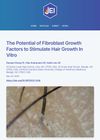 52 citations,
September 2018 in “International Journal of Molecular Sciences”
52 citations,
September 2018 in “International Journal of Molecular Sciences” Ginseng and its compounds may help hair growth and prevent hair loss, but more human trials are needed to confirm this.
 30 citations,
December 2018 in “International Journal of Biological Macromolecules”
30 citations,
December 2018 in “International Journal of Biological Macromolecules” Chitosan and surface-deacetylated chitin nanofibers may help treat hair loss.
 30 citations,
May 2018 in “Experimental Dermatology”
30 citations,
May 2018 in “Experimental Dermatology” The conclusion is that future hair loss treatments should target the root causes of hair thinning, not just promote hair growth.
 27 citations,
February 2017 in “Biomedicine & Pharmacotherapy”
27 citations,
February 2017 in “Biomedicine & Pharmacotherapy” White wax and policosanol from white wax effectively reduced hair loss and promoted hair growth in mice better than a known hair growth drug.
 13 citations,
January 2017 in “Molecules”
13 citations,
January 2017 in “Molecules” Compounds from Alpinia zerumbet may help with hair regrowth and cancer treatment by targeting PAK1.
9 citations,
July 2021 in “Journal of Medicinal Food” Lactobacillus paracasei HY7015 helps hair grow in mice.
 9 citations,
April 2019 in “Molecules”
9 citations,
April 2019 in “Molecules” Blackcurrant extract may help reduce hair loss by promoting stem cell activity in hair follicles.
 8 citations,
June 2021 in “Frontiers in Bioengineering and Biotechnology”
8 citations,
June 2021 in “Frontiers in Bioengineering and Biotechnology” Extracts from Alnus sibirica and oregonin may help with hair growth and prevent hair loss.
 7 citations,
March 2021 in “Evidence-based Complementary and Alternative Medicine”
7 citations,
March 2021 in “Evidence-based Complementary and Alternative Medicine” Nelumbinis Semen extract helps hair grow and could prevent hair loss.
 3 citations,
March 2022 in “Polymers”
3 citations,
March 2022 in “Polymers” Substances from Ascidian tunics might help treat hair loss as effectively as Minoxidil.
 3 citations,
January 2021 in “Journal of Bioscience and Bioengineering”
3 citations,
January 2021 in “Journal of Bioscience and Bioengineering” Sweet potato shochu oil and its components may effectively promote hair growth.
 2 citations,
January 2021 in “Journal of Cosmetics, Dermatological Sciences and Applications”
2 citations,
January 2021 in “Journal of Cosmetics, Dermatological Sciences and Applications” Olive Mill Wastewater extract could potentially improve hair growth and prevent hair loss.
 1 citations,
September 2023 in “Journal of cosmetic dermatology”
1 citations,
September 2023 in “Journal of cosmetic dermatology” Silybum marianum flower extract may help increase hair growth and decrease hair loss.
 1 citations,
May 2023 in “Frontiers in Pharmacology”
1 citations,
May 2023 in “Frontiers in Pharmacology” Millet seed oil may help hair grow by activating certain cell growth signals.
 1 citations,
May 2022 in “Pharmaceutics”
1 citations,
May 2022 in “Pharmaceutics” Tea seed oil in nanostructured carriers stimulates hair growth and feels less greasy when applied.
 1 citations,
January 2022 in “Stem cell biology and regenerative medicine”
1 citations,
January 2022 in “Stem cell biology and regenerative medicine” New treatments are needed for hair loss, and cell therapies might reverse hair thinning.
 1 citations,
January 2017 in “Elsevier eBooks”
1 citations,
January 2017 in “Elsevier eBooks” The document concludes that new treatments for hair loss may involve a combination of cosmetics, clinical methods, and genetic approaches.
May 2024 in “Molecules/Molecules online/Molecules annual” Plant extracts can help prevent hair loss and promote hair growth.

N793 may improve hair density in people with mild hair thinning.
 October 2023 in “Journal of Cosmetic Dermatology”
October 2023 in “Journal of Cosmetic Dermatology” A synthetic octapeptide may help promote hair growth and counteract hair loss.
 July 2023 in “Journal of Microbiology and Biotechnology”
July 2023 in “Journal of Microbiology and Biotechnology” Terminalia bellirica extract may help promote hair growth and prevent hair loss caused by testosterone.
 November 2022 in “Journal of Investigative Dermatology”
November 2022 in “Journal of Investigative Dermatology” The extract of Silybum marianum, Manganese PCA, and Lespedeza capitata can boost hair growth and extend the growth phase when combined in a serum.
 November 2022 in “Journal of Investigative Dermatology”
November 2022 in “Journal of Investigative Dermatology” The lotion with specific plant extracts effectively increased hair growth and improved hair cycle in subjects after 3 months.

Some fibroblast growth factors may promote hair growth similarly to minoxidil and could potentially treat hair loss.
 April 2018 in “Journal of Investigative Dermatology”
April 2018 in “Journal of Investigative Dermatology” Researchers found a substance in chicken egg yolk that helps hair grow.
 25 citations,
September 2020 in “Molecules”
25 citations,
September 2020 in “Molecules” Quercitrin may help treat hair loss by promoting hair growth and improving cell health.
 21 citations,
April 2018 in “Journal of Dermatological Science”
21 citations,
April 2018 in “Journal of Dermatological Science” Cilostazol helps hair grow by making hair root cells grow faster and changing growth factor levels.
 21 citations,
January 2018 in “The Korean Journal of Physiology and Pharmacology”
21 citations,
January 2018 in “The Korean Journal of Physiology and Pharmacology” Modified stem cells from umbilical cord blood can make hair grow faster.
 18 citations,
December 2020 in “Frontiers in cell and developmental biology”
18 citations,
December 2020 in “Frontiers in cell and developmental biology” miR-140-5p in certain cell vesicles helps hair growth by boosting cell proliferation.
 5 citations,
November 2022 in “Journal of Ginseng Research/Journal of ginseng research”
5 citations,
November 2022 in “Journal of Ginseng Research/Journal of ginseng research” Ginsenoside Re from Panax ginseng may prevent hair loss by maintaining autophagy and Wnt signaling in hair cells.




























